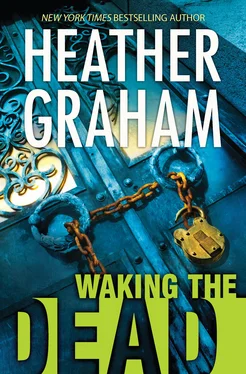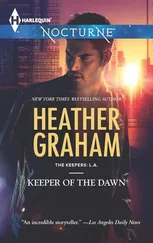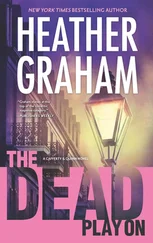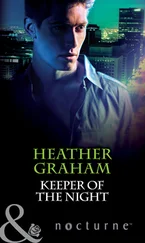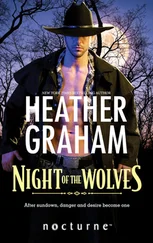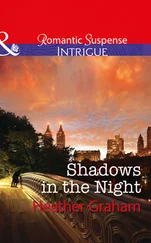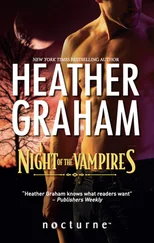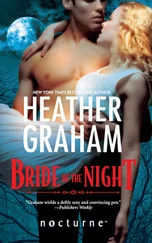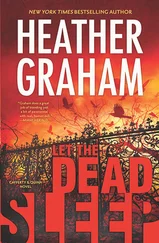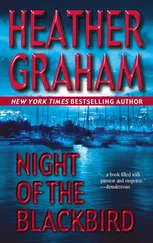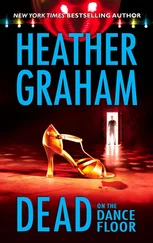Quinn felt his jaw tighten; what had been done to the grandmother was gut-wrenching. She really had no face. “Luckily, my boy,” Hubert said, “I believe she died instantly. The blunt force crushed her skull and bone shards went into the brain. However,” he said, moving again, “her husband died the most easily—a single gunshot dead-center to the head. No bullet in him or found at the scene, according to the police. But I still say he was lucky. He probably never knew what hit him.”
“Small mercies,” Quinn said.
“In this situation? Yes.” Hubert walked on to the next table. The woman lying there was pale and ashen; her lips were a sickly shade of blue. Hubert opened one of her eyes. “Petechial hemorrhaging in the eyes, the bruising around the neck. As we’d ascertained at the scene, this young woman was strangled and with great force. But I’ve looked at the bruising with a microscope. She was manually strangled, but there’s no indication whether the killer was left-or right-handed. As you saw at the house, it appears that she walked into the midst of the carnage and was caught before she could escape. Now, let’s return to Mr. Garcia.”
Hubert went back to the first body. “Here’s where it’s curious. Mr. Garcia was right-handed. It almost looks as if the wounds were self-inflicted. See how the cuts are on the left side of the body? And the deeper wounds, the stab wounds, are all toward the left. Even where his throat is slit. It could indicate that the man took a knife or a similar blade himself and swept it across his own throat in a left-to-right motion. There was also a great deal of blood on his right hand. However, at that point, he would’ve instantly lost so much blood that I estimate death would have occurred in under a minute—certainly not enough time to stash the weapon. And, of course, he couldn’t have gone far,” Hubert added dryly.
Quinn stared at him. “So?” he asked.
“So, I’m the medical examiner. You’re the investigator.”
“What you’re telling me is basically impossible. And yet based on what you’ve said—and what we discovered at the house—it looks like James Garcia got hold of a machete or a sword and sliced his wife to pieces in the kitchen. Then he moved around the house, dripping blood, found a heavy object and killed his mother-in-law with it, then found a gun and shot his father-in-law. After that, he headed downstairs, and strangled Maria Orr. Then he walked down the hall and stabbed himself several times before cutting his own throat and dying.” Quinn shook his head. “Pretty damned impossible. I don’t buy it.”
“Me, neither.”
“So, there had to be someone else there.”
“That’s what I’m assuming. Especially since there are no weapons.”
“So, someone went to the house with weapons, gave them to James Garcia, who murdered his family and committed suicide, and then took the weapons away?” Quinn asked cynically.
“That’s how it seems.” Hubert sighed deeply. “But, as I told you, I’m the medical examiner. You’re the investigator.”
“Has Larue been here yet?”
“He’s due anytime.”
Quinn felt a chill seep slowly into him. There was obviously something not right about the situation; Larue had known that immediately and that was why he’d called Quinn.
“Are you waiting for him?” Hubert asked.
“No. There’s not much point. I’m sure he’s working on backgrounds, but I don’t think this is about drugs, or a family feud or anything...”
“Ordinary?”
Quinn felt his brow furrow as he studied the bodies, then glanced back at Hubert. “Odd. You see a macabre game of Clue. I saw a strange painting this morning—or a copy of it—that this brings to mind.”
“Oh,” Hubert said. “Yeah. The Henry Sebastian Hubert. Ghosts in the Mind.”
“You know the painting?” Quinn asked.
“Of course.”
“Of course?”
“Believe it or not, I do enjoy art,” Hubert said. “But that’s not why I know that particular painting.”
“You are a descendant?” Quinn said.
“Sure am,” Hubert said, grimacing.
“But...”
“I don’t know how many ‘greats’ I am. The man was as bohemian as his friends. He had a wife he left in London. She had a child. That child had a child—you know how it goes. Anyway, my grandfather came to Minnesota and that’s where I lived until I came here. But, yes, I’m a descendant. And I’m sure of my facts because my mother was something of a family historian.”
“Now that’s a bizarre coincidence!”
“What’s really bizarre is that you saw the painting—or a copy of it. Hubert was talented but became obscure. I guess there’s been a revival of interest in his work, especially that piece. It has a long tangled history.”
“I heard some of it, and tangled is an understatement,” Quinn said. “Did you know there’s a copy—a giclée—at a shop on Royal Street?”
“Interesting. I’ll have to go by and see it. But right now I have a lot of work to do. Is there anything else I can tell you?”
Quinn shook his head slowly. “No, not now, thanks, Doc. I’ll see Larue later and find out what he’s learned so we can decide how we’re going to pursue this.”
Hubert nodded grimly. “Get this bastard—whether he killed the family, which is the most likely, or forced Garcia to kill them. He’s evil. Totally, heinously evil. Get him.”
Quinn left, stripping off his gown and mask. But as he hurried down to the street and his car, he found his mind twitching in different directions.
A game of Clue.
A painting of domestic bliss that wasn’t.
And someone—something—evil and alive in the city he loved.
Chapter Three
NATASHA, ALSO REFERRED to as Mistress LaBelle, was a renowned voodoo priestess in the Quarter. Danni had known her as long as she could remember—and loved her like a wonderful, eccentric aunt for every one of those years.
These days she realized that Natasha had more than just an understanding of people. Natasha’s faith was strong. She knew that spirits traveled in the world—and everything wasn’t plainly visible for the eye to see.
But Natasha also lived in the real world. Her shop was filled with wonders. The scent of incense flowed throughout; there were handcrafted masks on display, along with other artwork, jewelry and all kinds of gris-gris, since Mistress LaBelle catered to tourists, as well as the devout of her flock.
Natasha had a trusted wingman—Jeziah, who was at the counter when Danni entered the shop. He looked up when the door opened. As a few tourists clustered in a corner, choosing a mask, Jeziah smiled at her.
Jeziah was often quiet and stoic but he saw everything that went on around him. Danni knew that he gave his total loyalty to Natasha; Jez, she thought, could have done anything in life. He was intelligent and compassionate. He was also striking, his skin a beautiful dark shade and his eyes a brilliant green. Jeziah moved fluidly and with purpose and seemed able to converse on any subject. He was a good friend to have.
“She’s waiting for you,” Jez told her before she’d come even two feet into the store.
“You’re kidding me,” Danni said.
Jez shrugged. “Do I ever kid? She had a dream about you.”
“Oh?”
“She’s waiting.”
Danni could quiz him, but she knew he wouldn’t say any more, so she merely thanked him and walked out to the courtyard.
There were many beautiful courtyards in the Quarter. Danni particularly loved Natasha’s. Plants grew everywhere, adorned with wind chimes and dream catchers. She kept candles burning by her wrought-iron table, since she gave readings there, usually at night. She was pricey when tourists came calling, but a session with Mistress LaBelle was considered a coup.
Читать дальше
